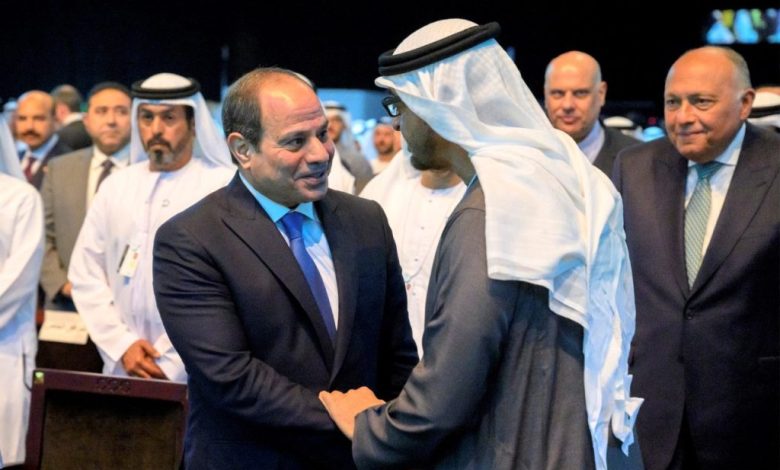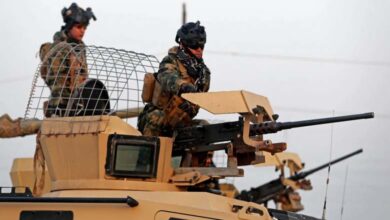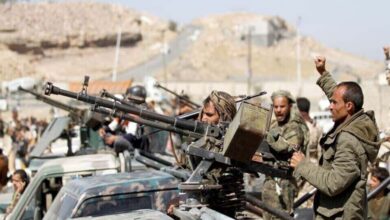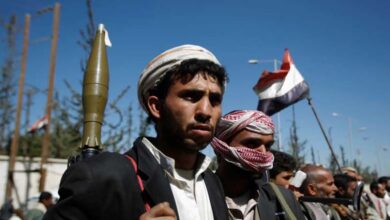Strong Emirati support for Egypt in the face of an economic crisis

AE President Sheikh Mohamed bin Zayed Al Nahyan met his Egyptian counterpart Abdel Fattah Al-Sisi on Wednesday in a brief visit to Cairo that comes amid intense diplomatic activity that could realign the situation and relations in the Middle East. The visit also comes at a time of economic crisis experienced by Egypt with a sharp decline in its foreign exchange reserves and a scarcity of dollars.
It is clear that Sheikh Mohamed’s visit to Cairo comes within the framework of co-ordinating efforts and strengthening bilateral relations, and also in the context of affirming the Emirates’ support for Egypt. Meanwhile, the Egyptian president is intensifying his meetings with the leaders of the Gulf countries against the backdrop of an economic crisis that his country is going through and the changing diplomatic situation in the region.
“We discussed strengthening our deep-rooted fraternal relations and our vision to promote peace, stability and prosperity in the region,” the UAE president said in a tweet. His remarks are in line with the unrelenting efforts of the UAE to strengthen security in the region and focus on economic development in a forward-looking approach that takes into account regional and international political variables.
“The two presidents discussed ways to develop mechanisms and frameworks for joint cooperation in all areas for the benefit of the two brotherly peoples, in addition to close coordination on various regional developments, in light of the main pillar of Egyptian-UAE cooperation and coordination to consolidate security, stability and development in the region,” Egyptian Presidential Spokesperson Ahmed Fahmi said on the Facebook page of the presidency.
“The meeting also dealt with an exchange of views on the most prominent issues on the regional and international arenas,” he said. “The discussions reflected a mutual understanding on ways to deal with these issues, and it was agreed to continue joint efforts to strengthen co-operation, co-ordination and solidarity among Arab countries to confront the growing challenges at all levels.”
The visit is the UAE president’s second to Egypt since becoming president and the 18th since al-Sisi took office in 2014. The two leaders have met 28 times since 2015 (including the time when Sheikh Mohamed was crown prince of Abu Dhabi and the subsequent period when he succeeded his late brother Sheikh Khalifa bin Zayed al-Nahyan as president). This points to Egypt’s strong ties with the UAE.
The UAE is leading efforts to promote security and stability in the region in co-ordination with its partners with a confident vision manifested in strengthening Arab unity in the face of regional and international fluctuations. The UAE has been proactive in revitalizing its diplomacy in Syria based on political realism similar to that of other countries.
“For more than a year, Cairo has been struggling to strengthen ties with the Gulf states, while the war between Russia and Ukraine, the world’s biggest importer of wheat, has worsened its economic crisis.”
In one year, Egypt lost 20% of its foreign exchange reserves, which fell to $34.45 billion. The reserves include $28 billion deposited by Egypt’s Gulf allies with the Central Bank of Egypt.
Inflation in Egypt, a country of 105 million people, has risen to 33.9%, a situation exacerbated by the ongoing collapse of the pound’s exchange rate, which has lost around 50% of its value in a country that depends on imports for both production and consumption needs.
Experts have been emphasizing for months that Egypt is one of five countries facing the threat of default. In March, Egypt’s public debt reached an all-time high of $162.9 billion, according to the Ministry of Planning and Economic Development.
Gulf states say they will not invest meaningfully, but many Gulf companies have recently established acquisitions in Egypt, a move experts say will ease the crisis facing Cairo and at the same time benefit the acquisitions.
The GCC sovereign funds are destined for tens of companies offered for sale by the Egyptian government, but these funds set conditions for their purchase.
Among the conditions are that Egyptian companies publish their accounts and that sales take place at the new exchange rate, which means less in dollars for acquisitions. To date, several bids have been submitted, but many have failed or not yet been completed.
Egypt, where the Arab League is headquartered, is a balancing player on the volatile Arab diplomatic scene. “Egypt’s relations with Syria, which has remained isolated in the diplomatic arena since the outbreak of its civil war in 2011, have converged on those with Gulf allies led by the UAE, but Cairo has not yet taken a clear position on Iran.”
On Wednesday, Saudi Arabia received an Iranian delegation as part of efforts to reopen diplomatic missions after seven years of isolation.
The resumption of diplomatic relations between Saudi Arabia and Iran would draw a new regional map in a region that has long been divided between Saudi and Iranian influence.
“Not far from it, Syrian Foreign Minister Faisal Mekdad was in Riyadh as the first high-ranking Syrian official to visit the country in more than a decade.”
This unannounced visit reflects the pace of the Syrian-Saudi rapprochement amidst the UAE’s initial engagement with the Gulf states.
The visit comes ahead of a consultative meeting scheduled for Friday in Jeddah of Arab and Gulf Co-operation Council (GCC) foreign ministers at the latter’s invitation to discuss Syria’s return to its seat in the Arab League.
Earlier this month, Egyptian President Abdel Fattah al-Sisi paid a brief visit to Saudi Arabia during which he met with Saudi Crown Prince Mohammed bin Salman to discuss “strengthening cooperation and regional and international developments” amid efforts by both countries to rearrange their relations with countries in the region. Cairo is seeking economic support from the kingdom to overcome a financial crisis with the decline in the country’s foreign exchange reserves, rising inflation and currency depreciation.
During a meeting held at the Suhoor table in Jeddah, western Saudi Arabia, in the presence of Egyptian Intelligence Chief Abbas Kamel and Saudi National Security Advisor Musaad bin Mohammed Al Aiban, the two discussed regional and international situations and prospects for joint cooperation, according to the official Saudi Press Agency.












